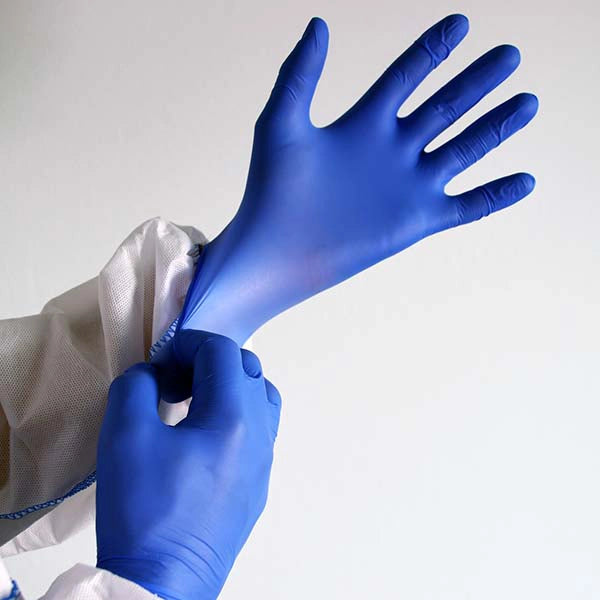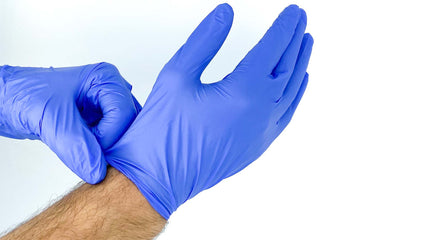Proper hand protection is the first line of defense for nurses and other healthcare workers working in risky environments. Seeking out the best gloves for nurses is a smart decision for any RN who wants to stay safe. And if you need to supply gloves for your entire medical facility, providing the right type can give your nursing staff added protection and peace of mind.
There are various forms of protective single-use gloves on the market today. Latex, vinyl, and nitrile gloves are the most common, but there are many others. All of them offer different levels of durability, protection, and comfort. With so many options, how can you tell what are the best disposable gloves for nurses?
Nitrile disposable gloves are considered the best choice for nurses seeking reliable hand protection. They provide a strong barrier to keep hazardous fluids from touching the skin, halt the spread of germs, have superior tear resistance, and are 100% latex-free — making them the right choice for nurses in medical environments and care facilities.
At a glance:
Why Nurses Wear Gloves
Healthcare professionals like nurses face many different risks, which makes it crucial to wear the right type of protection. Quality disposable gloves are essential for their safety, as well as for their patient’s well-being.
Here are just a few of the many reasons why single-use gloves are critical in the medical environment:
- It’s common for nurses to come into contact with potentially infectious materials, including blood and other bodily fluids. Gloves provide a barrier to keep them safe from biohazards.
- Nurses often work directly with people who have contagious conditions. The ability to quickly swap gloves prevents the spread of disease when caring for multiple patients.
- A clean pair of gloves helps avoid the risk of exposing patients with compromised immune systems to harmful microbes.
- RNs handle needles and other sharp medical equipment that could cut or puncture unprotected skin.
- Products used for disinfection in hospitals are often much harsher than household cleaners. Wearing gloves helps shield them from skin irritation.
- Given all of the potentially dangerous substances nurses come into contact with, cleaning their hands is not enough to protect them. Take a look at our post that touches on the subject of gloves vs hand washing for more information.
Because they can provide a fast, effective, and quickly removable barrier against harmful substances, disposable gloves are indispensable safety tools for nurses.
Features to Look For in Gloves For Nurses
What kinds of gloves will serve nurses best? You can help choose the right type by taking into account the following questions:
- Are they waterproof/liquid proof? Nurses need gloves that won't let bodily fluids leak through.
- How chemical resistant are they? Healthcare workers may have to handle harmful chemicals like chemotherapy drugs.
- Do they puncture easily, or are they durable? Gloves that sharp objects can easily pierce aren't a great choice for anyone performing injections.
- Do they contain powder? The FDA has banned powdered gloves in most medical environments.
- Will they allow you to feel objects and handle small items well? Nurses should wear hand protection that retains their sense of touch to perform certain tasks that require it.
- Do they hurt your hands while trying to remove them? Gloves are changed out with each new patient, so choosing a product that's easy to put on and remove is essential.
- Do they offer a comfortable fit? Medical staff typically wear hand coverings throughout the day, so comfort must be taken into account.
- Are they slippery? Maintaining a good grip is important when handling glass vials and hazardous waste.
- Are they FDA-approved? Medical-grade gloves must meet strict quality standards.
- Have they been sterilized? Most healthcare tasks don't require sterile medical gloves, but nurses in surgical operating rooms and certain other settings may need them.
What Are the Best Gloves For Nurses?
With the above crucial features in mind, let's look at the types of disposable gloves available to nurses.
Latex Gloves For Nurses
For many years, latex gloves were the undisputed #1 choice in the healthcare industry. Natural rubber latex is quite elastic, hugging the hands for a natural, comfortable fit and high tactile sensitivity. That's useful when performing delicate procedures or examining a patient's body for signs of illness.
The problem is that latex gloves can cause allergic reactions, especially with frequent use. As a result, many nurses have latex allergies, as do their patients. If you have a latex allergy or work with patients who could be allergic, it's important to wear 100 percent latex-free materials.
Vinyl Gloves For Nurses
One option for those who need latex-free gloves is vinyl, also known as polyvinyl chloride or PVC. This plastic material contains none of the proteins that trigger latex allergies. It's also very inexpensive. In addition, the low friction resistance of vinyl gloves means you can change them quickly.
Disposable vinyl gloves have some important drawbacks, though. The material provides a less sturdy barrier against infectious diseases or harsh chemicals. And vinyl gloves tend to be less form-fitting and durable.
Vinyl disposable gloves can be safe for medical use in brief, low-risk tasks like dispensing oral medications or helping move patients. For prolonged use or sensitive procedures, they're usually not the best option.
Nitrile Gloves For Nurses
Based on all the specifications and requirements of the medical field, it’s clear that the best disposable gloves for nurses are nitrile-based exam gloves. They're hypoallergenic, flexible, and tougher than both latex and vinyl. We'll review, in detail, what makes them the right choice for nurses working in hospitals, emergency rooms, urgent care facilities, and other demanding settings.
How Do Nitrile Gloves Stand Up to the Needs of Nursing Professionals?
Nitrile gloves are the better choice for nurses because of the following qualities:
1. Nitrile is a Durable Material Well-Suited to Handling Sharp Objects
As mentioned above, since nurses can be exposed to fluids such as blood and saliva, it’s important to choose gloves that have superior puncture and tear resistance. If you have a small puncture hole in your gloves that you don’t see, and you get exposed to a patient’s blood, it could be extremely dangerous.
Nitrile is more durable than latex or vinyl when it comes to tears and puncture holes. This alone makes this type of disposable glove better for nurses.
2. Healthcare Professionals Require Material With High Tactile Sensitivity Nitrile Provides
Nurses should wear hand protection that doesn't hamper their sense of touch and allows them to handle objects easily. Nitrile hospital gloves enable nurses to easily perform medical exams that require touching their patient’s body, feeling for lumps, and the like. Tactile sensitivity is a must in this case.
Additionally, small medical tools, needles, and bandages are often used by nurses. The flexibility of nitrile gloves allow for picking them up and utilizing them with no issues.
3. Nitrile Gloves Are a Latex-Free, Hypoallergenic Option
As a nurse, you most likely know how severe a latex allergy reaction can be. Due to the high risk to yourself, your fellow nurses, and your patients, latex is rarely a safe choice.
Nursing professionals should instead use nitrile gloves, which are 100 percent latex-free. This will greatly reduce the risk of allergic reactions or developing a latex allergy. For a more detailed comparison, see our list of 9 reasons why nitrile is better than latex.
4. Chemical Resistant Nitrile Gloves Keep an RN's Hands Protected
The best gloves for nurses who work with potentially harmful chemicals are nitrile-based. This material is proven to stand up to a wide variety of chemicals much better than latex can. This includes disinfectants, antiseptics, cleaning products, and even dangerous residues from medications. Take a look at our complete guide to nitrile glove chemical resistance for more information.
5. Waterproof Hand Protection Provides a Much-Needed Barrier
Nitrile gloves are completely waterproof, so for those nurses who provide their patients with baths, they’re a good choice. In addition to this, because no liquid can penetrate them, they are especially fitting for nurses who often come into contact with blood and other bodily fluids.
6. Powder-Free Nitrile Gloves are Best for Medical Environments
Latex gloves are often coated with cornstarch powder to make them easier to put on and take off. However, covering your hands with powdered material can cause issues within a medical environment.
When gloves are taken off, or changed, the powder has been known to become airborne. This could be dangerous if those with a latex allergy were to breathe in the powder particles or if the powder were to land on an open wound. The end result could be airway or wound inflammation.
Powdered material is not advised even when non-latex hand protection is used – it should be avoided altogether. Fortunately, powder is unnecessary for most nitrile gloves. The material goes through a special process that gives it similar properties to powdered gloves, such as easy removal.
The Best Disposable Gloves For Nurses
Looking for some specific recommendations for nursing gloves? Here are our top picks for RNs and other patient care specialists:
#1: HandCare Blue Nitrile Gloves - Exam Grade, Powder Free (4 Mil)
HandCare's dependable powder-free gloves contain zero latex, minimizing the risk of allergic reactions in users or patients. With a 4 mil thickness, they'll allow for excellent touch sensitivity and range of movement, and their textured fingertips will help you keep your grip on delicate instruments. These are ideal gloves for a wide range of medical tasks.
#2: MedPride Powder-Free Nitrile Exam Gloves
These flexible, form-fitting medical gloves are great for healthcare settings of all kinds. Like the HandCare gloves above, the fingertips have a textured surface to improve your grasp on smooth or slippery objects. The beaded cuffs help you slide them on and off easily with less risk of rips or tears.
#3: Eagle Diamond Textured Nitrile Gloves, 6 Mil
Nurses looking for a bit of extra grip might want to try these gloves, which feature a raised diamond pattern for added friction. At a thickness of 6 mils, they're slightly less sensitive than most exam gloves, but also more puncture resistant. Though they're described as "industrial", their acceptable quality level (AQL) of 1.5 means they qualify as medical-grade rather than industrial-grade gloves.
Final Thoughts
Nitrile gloves are the superior choice for nurses in need of the best hand protection. No matter why you need disposable gloves — to prevent transmission of infections, to avoid contact with bodily fluids, or to keep your hands chemical-free — nitrile offers the best combination of flexibility, toughness, and safety. Browse our collection of exam-grade gloves to find the perfect size, thickness, and style for your workplace.




